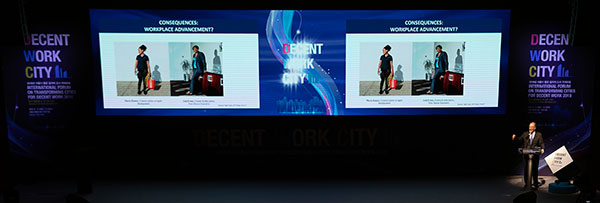
During his trip to Seoul in December, Dean David Weil spoke at length with SisaIn magazine about his tenure as the Administrator of the Wage and Hour Division at the U.S. Department of Labor from 2014 to 2017.
He discussed the Obama administration’s labor reform efforts, including trying to raise the minimum wage from $7.25 and passing legislation to reform union representation and collective bargaining laws for private sector workers. Since President Obama faced a Republican-controlled Congress, President Obama asked agencies in the Labor Department to focus on reforms and initiatives that didn’t require Congressional approval.
"First, this led us to initiative a major overhaul of federal overtime pay provisions (dating back to the 1940s). The changes we moved through the regulation process would have extended overtime coverage to 4.2 million workers and provide additional protections to almost 9 million workers beyond that. Second, we put forward regulatory changes (that we ultimately defended successfully all the way up to the Supreme Court) that extended minimum wage and overtime protections to homecare workers. Third, we raised the minimum wage to $10.10 for contractors to the federal government including their subcontractors.” The agency also issued impactful guidance regarding who under federal labor standards can be legitimately considered an “independent contractor” versus employee as well as guidance on joint employment. Both pieces of guidance, and enforcement efforts related to them, were a part of a second major area of initiatives related to the “fissured workplace,” a term coined by Dean Weil.
The fissured workplace is a term to describe changes in business organization that have shifted millions of workers from direct employment of major businesses to a host of other relationships, said Dean Weil. That change in employment structure often undermines compliance with labor and workplace laws, makes career and labor market mobility more challenging for workers, and shifts risks to the workforce.

“For example, those who worked at logistics centers 20 years ago were directly employed by major retailers. Today, retailers do not hire workers directly, but instead subcontract the management of retail distribution centers to major logistics companies. Those companies, in turn, shift much of the labor intensive work to subcontractors and staffing agencies. In some cases, those staffing agencies treat their workforce as independent contractors. So, even though workers are still doing the work carefully managed by standards and incentives set by the retailer, the employment relationship has been divided into the hands of multiple organizations. This undermines compliance, pushes down wages, and often shifts risks like those arising from safety at work onto the work force.”
The fissured workplace is the result of a fundamental restructuring of the economy, said Dean Weil, as companies face more pressure to increase returns for investors. To do so, they lay off staff and focus on core competencies, reducing costs. However, this can lead to greater risk of labor law violations and accidents, and also leads to increased income inequality.
Public policies seek to provide protections from risks and improve conditions for workers, said Dean Weil. The fissured workplace increases short-term profits but often increases job insecurity and reduces those protections, which often shifts the burden to society as a whole. In thinking about future policies for the US or Korea, we need to evaluate how to hold businesses responsible for the conditions that help create the value arising from their activities in a responsible manner. While companies may push back and say they need flexibility to innovate, Dean Weil said he believes it’s possible to do that while also following the law and fairly compensating workers.
Read the full-length article in Korean.
